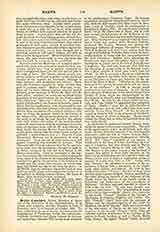

Martin of Leon, Saint, a priest and canon regular of the Augustinians; b. at Leon in Spain (Old Castile) before 1150; d. there, January 12, 1203. Having been educated in the monastery of St. Marcellus at Leon, he visited Rome and Constantinople. Returning to Spain, he took the religious habit at St. Marcellus; but this monastery having been secularized by the bishops, he entered the collegiate church of St. Isidore in the same city. The date of his death is given us by the necrology preserved in the monastery. He wrote commentaries on different Epistles and the Apocalypse, and left numerous discourses on the most varied subjects. His complete works were published first by Espinosa (Seville, 1782) and again by Migne in P.L., LXXXI, 53-64, CCVIII, CCIX (Paris, 1855). The religious of St. Isidore’s dedicated a chapel to Martin very early and celebrated his feast each year, but the Church has not officially included him in the list of her saints.
LEON CLUGNET

